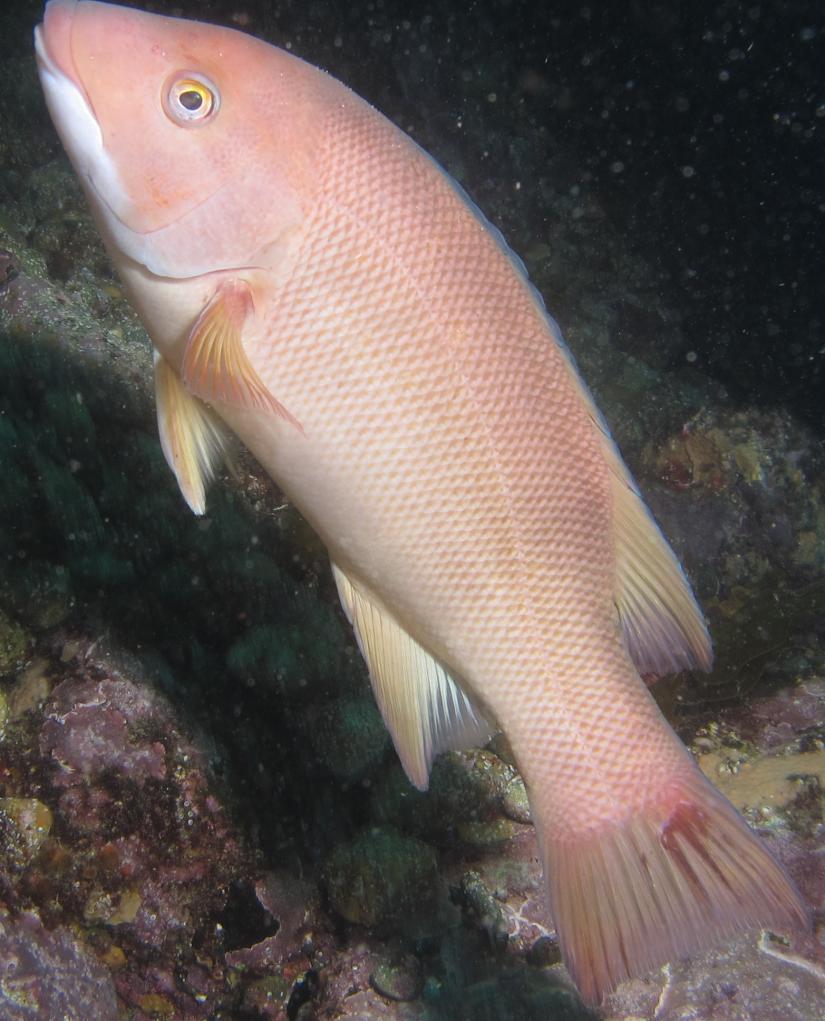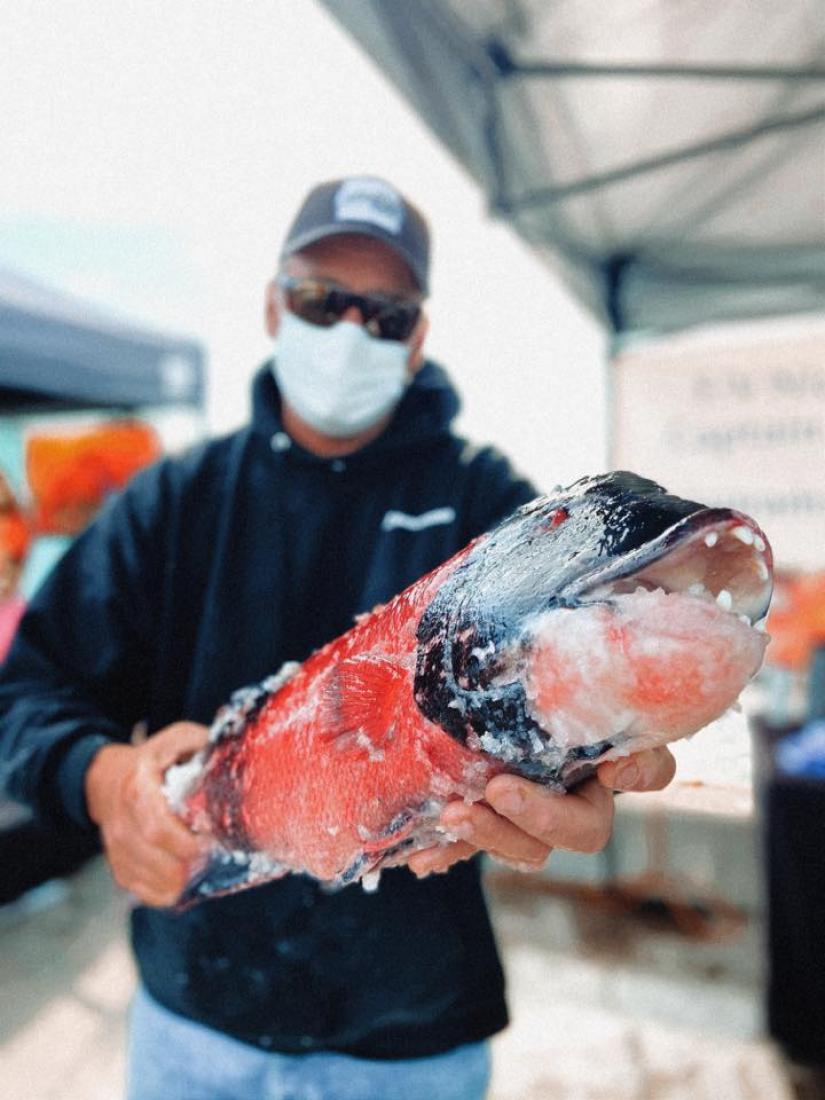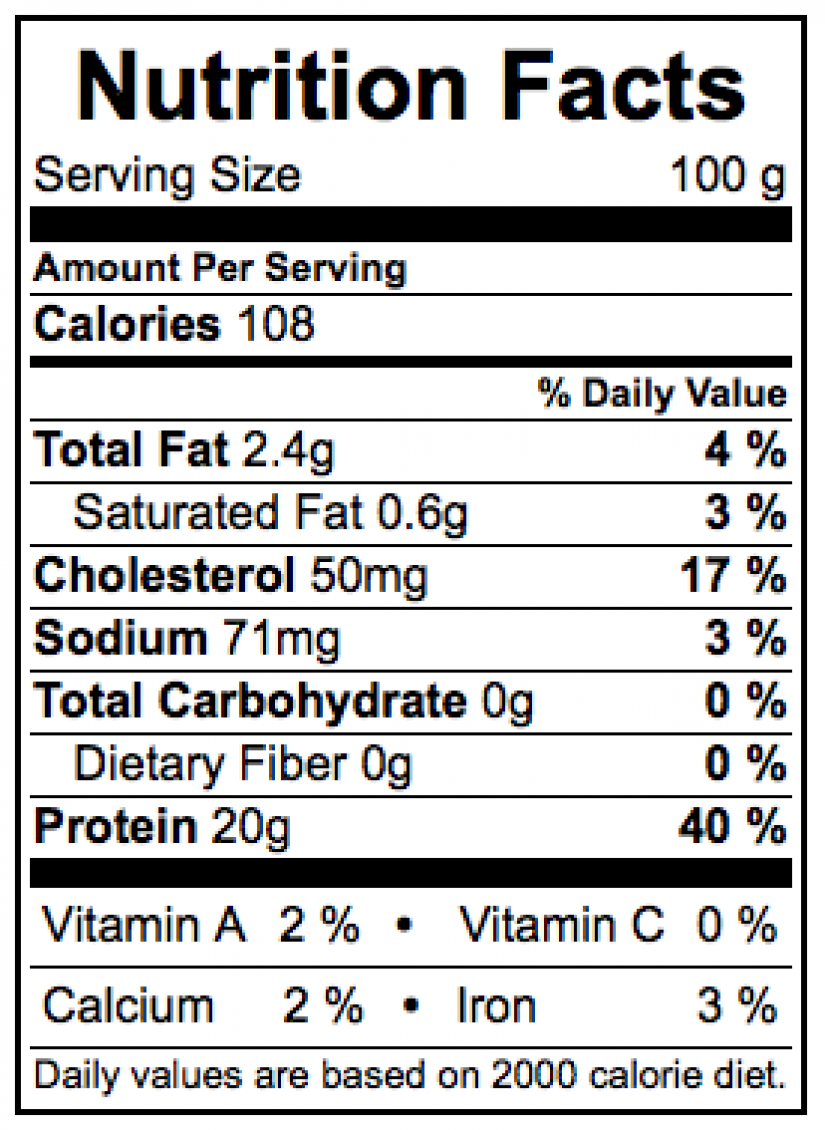California Sheephead
Bodianus (formerly Semicossyphus) pulcher
The Science
THE SCIENCE
This fish is born as a female, but often becomes male later in life!

Taxonomic description
- Juveniles are bright reddish-orange with large blue spots on fins. Adults are sexually dimorphic; males black with a red-pink midsection, along with red eyes and a prominent “sheep-like” head, females fully pink with a white underbelly and smaller. [4]
- As a large wrasse, it can grow to be 16 kg (35 lbs.) and 1 m (3 ft.) long. [4]
- Has protruding teeth, used to prey on hard-shelled organisms.
Distribution
- Eastern Pacific from Point Conception in California, to Guadalupe Island (off northern central Baja California) and the Gulf of California, Mexico. [3]
Life history
- Is incredibly long lived. Its maximum known lifespan in the wild is 53 years, though most members of this species do not reach this age (in part due to fishing pressure).
- Is a sequential hermaphrodite as an adult, changing from a fully functioning female to fully functioning male after reaching a certain size. Sex change in this species is unidirectional. [5]
- As a male, this fish establishes a spawning territory during mating season (July-Sept.), and defends a group of females with which he breeds. [5]
Habitat
- Inhabits rocky reef/kelp bed habitats, normally between 3-30 m deep. [4]
- Hunts in the day for sea urchins, bivalves, barnacles, and bryozoans. [4]
- Often prey of pinniped species such as the harbor seal and California sea lion. [4]
- At night, it takes refuge in crevices where it wraps itself in a mucous cocoon to hide scent from predators.
- Vulnerable to parasitic flatworms, but the mutualistic senorita fish cleans parasites from the fish’s skin and gills. [4]
The Fishery
THE FISHERY
This fish has been commercially caught in California since the late 1800’s.

Seasonal availability
- Commercial fishing is subject to bimonthly trip limits, and the fishery is typically closed from March to April due to closures for rockfish. [1]
Regulatory and managing authority
- As established by the Marine Life Management Act, the California Fish and Game Commission regulates the fishery, and the California Department of Fish and Wildlife manages this fishery through the California Nearshore Fishery Management Plan (NFMP). [1,2]
Gear type
- Caught with line and hook, and traps (with a small proportion incidental catch in the offshore gillnet fishery). [1]
Status of the fishery
- At the current level of exploitation across its range, it is considered ‘vulnerable’ on the IUCN Red List of Threatened Species. [3]
- The upper limit on historical population size in the species’ known habitat is 70,380,000. It is unclear what the population size is currently. However, increased fishing and lower overall catch indicate a decreasing population size. [3]
- Size and bag limits, fishing season, and classification under the Nearshore Fishery Management Plan are working in concert to keep Sheephead population at a healthy size, and act as precautionary measures due to low data availability. [3]
Potential ecosystem impacts
- It is a keystone predator of the purple sea urchin that limits urchin grazing on kelp. Removing this predator can result in an increase in urchin numbers and grazing pressure on kelp, with subsequent knock-on effects for kelp dependent species.
The Seafood
THE SEAFOOD
Sheephead’s mild flavor and delicate texture lends itself to any recipe calling for white fish.

Edible portions
- Whole fish can be eaten, and can be used in fish stock as well. [6]
Description of meat
- White and delicate, with a mild flavor. [6]
Culinary uses
- This fish yields large fillets with skin on or off depending on how the fish is to be prepared. It can also be cooked whole.
- The delicate flesh makes this fish hard to sauté. Common cooking methods include steamed, fried, or grilled. [6] This is a typical ocean white meat fish that can be used in a variety of recipes.
- For an Algerian fish soup recipe, visit Food.com. [8]
Nutritional information
- High in protein (96% DV), vitamin B12 (71% DV), and selenium (136% DV). [7]
Toxicity report
- Not particularly vulnerable to any specific toxins, though care should be taken if caught in heavily polluted waters (offshore).
Seasonal availability
- March - December.
References
[1] California Department of Fish and Wildlife. 2019. California Sheephead, Semicossyphus pulcher, Enhanced Status Report. Web. https://marinespecies.wildlife.ca.gov/california-sheephead/management/. Accessed 27 August 2020.
[2] Nearshore Fishery Management Plan. n.d. California Department of Fish and Wildlife. Web. https://wildlife.ca.gov/Conservation/Marine/NFMP. Accessed 20 August 2020.
[3] Cornish, A. & Dormeier, M. 2006. Semicossyphus pulcher, The IUCN Red List of Threatened Species. Web. http://www.iucnredlist.org/details/61340/0. Accessed 29 May 2017.
[4] Doan, T. et al. 2012. Semicossyphus pulcher California sheephead. Web. http://animaldiversity.org/accounts/Semicossyphus_pulcher/#references. Accessed 29 May 2017.
[5] Sundberg, Michael. 2009. Gonadal Restructuring During Sex Transition in California Sheephead: a Reclassification Three Decades After Initial Studies. Bulletin, Southern California Academy of Sciences 108 (1): 16–28. Web. https://www.ncbi.nlm.nih.gov/pmc/articles/PMC4386901/. Accessed 27 August 2020.
[6] Sarmiento, J. 2013. Target Species: California Sheephead. Web. http://www.socalsalty.com/general/target-species-california-sheephead-2/. Accessed 29 May 2017.
[7] Nutrition Value. 2017. Fish, dry heat, cooked, sheepshead nutrition facts and analysis. Web. https://www.nutritionvalue.org/Fish%2C_dry_heat%2C_cooked%2C_sheepshead_nutritional_value.html. Accessed 29 May 2017.
[8] Halalmom. Food.com. 2006. Algerian Fish Soup Recipe. Web. https://www.food.com/recipe/algerian-fish-soup-197058#activity-feed. Accessed 12 January 2021.
[9] Elyash, M. flickr. 2015. California Sheephead (Semicossyphus pulcher). Digital image. Web. https://www.flickr.com/photos/californiadfg/22203329888. Accessed 16 February 2021.
[10] Bierman, E. flickr. 2012. Female Sheephead. Digital image. Web. https://www.flickr.com/photos/edbierman/7622464438. Accessed 16 February 2021.
[11] Tuna Harbor Dockside Market. Facebook. 2020. Digital image. Web. https://www.facebook.com/thdocksidemarket/photos/4078143708881548. Accessed 16 February 2021.
[12] James. flickr. 2013. Digital image. Web. https://www.flickr.com/photos/40726522@N02/9277764323. Accessed 16 February 2021.



